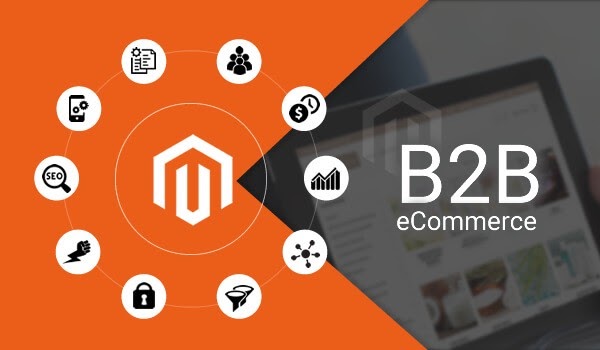B2B is a growing market. Digital Commerce 360 reported that B2B e-commerce sales have surpassed $1 trillion — and are expected to continue growing. And as a result of this rapid growth, B2B merchants need to align themselves with their clients and provide the best user experience.
The Magento e-commerce platform has been around since 2008 and its main selling point is catering to both B2B and B2C — it includes a lot of features and tools to streamline browsing, ordering, and shipping. Leverage all the features of Magento B2B e-commerce, offer reliable, high-performance purchasing experiences without expensive capital expenses, and drive your B2B sales forward. And if you can’t meet these demands, your competitors will. But operating a B2B ecommerce website is difficult, so don’t hesitate to contact Magento development company for any assistance.
In this article, we’ll jump into Magento B2B and find out what it includes.
Magento Commerce includes everything you need to manage B2B eCommerce sites for multiple brands, channel partners, or key accounts. Your business to business customers can self-manage their company accounts and set up multiple tiers of buyers with specific roles and permissions.
But one of the biggest issues for B2B commerce platforms is flexibility and Magento is highly flexible and customizable. Put simply, you can set up your store to cover all the bases from customer engagement to fulfillment.
What the Magento B2B Suite offers merchants
- Sophisticated order management
- Real-time inventory
- Optimized fulfilment costs and delivery times
- Automated business rules
- B2B company accounts
- Configurable products
- Quote management tools
Magento 2 B2B feature list
As you can see, Magento is an all-in-one platform providing rich, built-in B2B functionality to reach even the most challenging B2B business goals. Let’s take a look at B2B ecommerce features in detail.
Quick order/Reorder
B2B customers usually know exactly what they need to order at your website. With Magento 2 B2B quick order feature, the purchasing process has never been easier. Magento quick order simplifies the order process, as a result it allows customers to add items to the cart by inputting one or more SKUs without navigating from various product pages. Moreover, Magento also makes reordering faster than ever before. Now buyers can create multiple lists just by copying prior orders and choosing ‘add to requisition list’ in category pages, in this manner, avoiding a lot of unnecessary clicks.
Magento multi-source inventory
Magento introduced the Multi-Source Inventory (MSI) aimed to handle a particular product quantity from different sources or locations. The MSI gives the store owners the possibility to manage multiple sources, handle stock for every warehouse and create multiple business structures, brands, etc. Moreover, now the B2B store owners can add, delete, sort and control company users.
Request for quote
In order to earn a B2B order, you should negotiate with a customer. That’s why nowadays every successful B2B website offers users the opportunity to request a quote from the cart, previous quotes or orders. Basically, quote summaries give customers the information they need to optimize the returns from proposals and calculate potential discounts. While initiating a quote, the customers can submit notes, leave comments, and upload files to justify their inquiry. In return, merchants can respond to the request, modify, reject or optimize it..
Payment on accounts
Payments in the B2B model are specific to each customer and it is extremely common for B2B customers to have open accounts with a supplier. With activation the option “Payment on account” merchants can give credit to their customers and set credit limits for each account. Also, they can check customer credit status before approving the payment on account method on checkout.
Customized catalogs
Magento enables B2B companies to create customised catalogs and price lists and assign them to individual companies or groups of companies. With this option you can determine which products to include and which to exclude, filter out items that are shown in search results, and more. Once a custom catalog has been created, you can simultaneously set prices for sole or multiple products and apply fixed or dynamic pricing models to provide percentage discounts.
Requisition list
With requisition lists, users can set up lists of favorite products they often purchase. Buyers simply need to select the desired products from the list, enter the quantity and add it to the shopping cart. They can set up different lists for different needs. This makes placing orders for renewables and other frequently ordered items faster and easier in just a few clicks.
Takeaways
74% of B2B buyers say that buying from a website is more convenient than placing an order with a sales representative, and 57% of B2B customers want access to their accounts online, according to Forrester. So the eCommerce B2B market has been on the rise in the last few years and Magento is clearly committed to helping merchants take advantage of that trend. Magento provides a seamless experience without any hassle for your wholesale customers. You can have one site with one brand, a unified product catalog, and appeal to the evolving market of (millennial) B2B clients.
If you want to up your B2B commerce game, the next step is to consult a reputable ecommerce development agency to find out the best way to develop a strong B2B solution.
